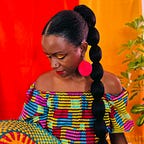Religion & Spirituality
I did not find God in the church. Let’s just get that out of the way from the beginning.
It wasn’t for a lack of trying — my parents tried their best to ensure my brother and I were brought up in community with the Presbyterian church in our area. We went often and at some point, I even volunteered to teach Sunday school. If it wasn’t a personal choice, I was at least committed to seeing it through. The more I learned however, the more I started questioning. It didn’t help that this was right around the same time that I was figuring out the values I wanted to live by as an individual. I knew without a doubt that I was a feminist. I knew without a doubt that I believed queer people deserve to live freely, openly, with access to the full spectrum of rights afforded to all human beings. I knew without a doubt that the thought of being considered someone not quite on equal standing with a man, and therefore expected to be subservient, was never going to be something I could wrap my head around or accept on the basis that it is considered God’s word.
As all these beliefs were taking root, I had to decide whether it was worth ignoring my convictions to dig deeper into being ‘right’ with God. I kept coming back to the same question: how does an institution whose main tenets claim to be rooted in the message of universal love, turn out to be so exclusive? All these conditions that are metered out against certain aspects of humanity that I both identify and empathise with, left me with an all-consuming doubt that the church didn’t have adequate answers for because you were expected to simply trust that that’s the way things God intended for them to be and there was nothing anyone could do about it. I decided I needed more time to figure things out on my own and had to leave the church — so I simply stopped going.
I let myself acknowledge that while I didn’t have all the answers, I wasn’t going to pretend that what was being laid out for me made sense if it didn’t. In its place, I let myself explore different avenues of spirituality until I was drawn to eastern philosophies and aspects of African spirituality that are more liberal and don’t require that a certain type of person question their morality for simply existing. Here is where things made more sense to me.
My personal opinion is that most religions do a great disservice to anyone who does not exist as a straight, white man in the world. We constantly see this not just in the messaging from some interpretations of the bible, but equally in the way that church structures themselves are upheld. I think it’s useful for everyone to at least acknowledge the truth in this. Which isn’t to say most people don’t find a true sense of meaning and belonging within the church, it’s simply admitting that for a long time, the systems behind church structures have been harmful to a significant subset of people and that is something we all need to confront outside of our personal beliefs.
I’m not so much mad at the church for gatekeeping spirituality as I am at letting people believe anything that takes them away from their authentic selves could ever be good for them.
I don’t speak for everyone — there are people who perhaps don’t fit into what we might consider most religious institution’s target audience who have found a way to coexist with their faith. As I have been reminded from time to time, there are certain areas where the church is more beneficial to society than it isn’t. The genuine sense of community, leadership and comfort that people often find in the church, including a sense of personal spiritual growth and guidance through the different seasons of life are all things we would be worse off without. At the end of the day, what your preferred spiritual practices look like is a personal decision that works differently for everyone.
To conclude, my plea is simply to look inward more and let yourself wonder what you really connect with outside of the things you may have been led to believe. And let us be mindful not to judge others for choosing to connect with the world around them differently because our journeys can never be one and the same.
